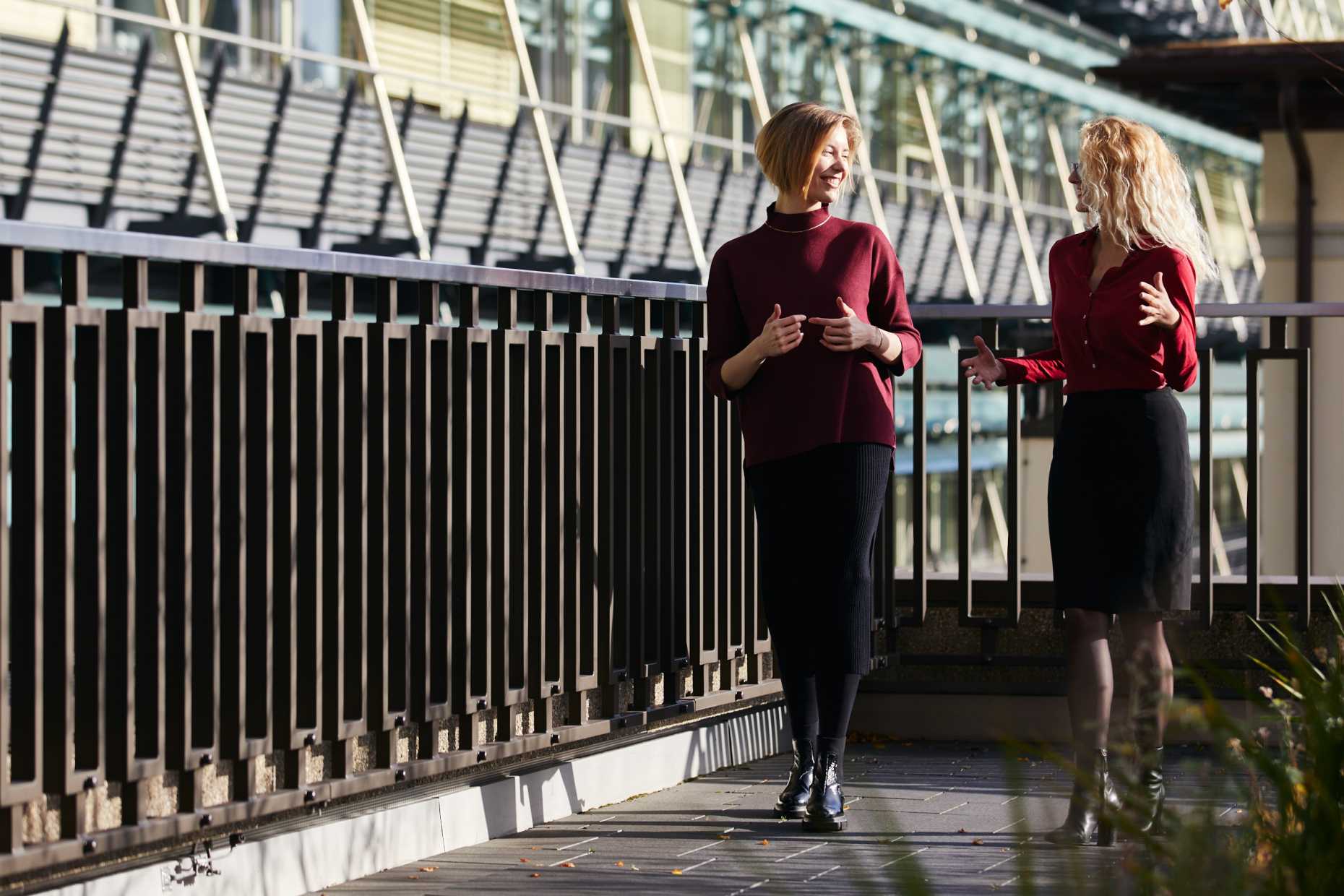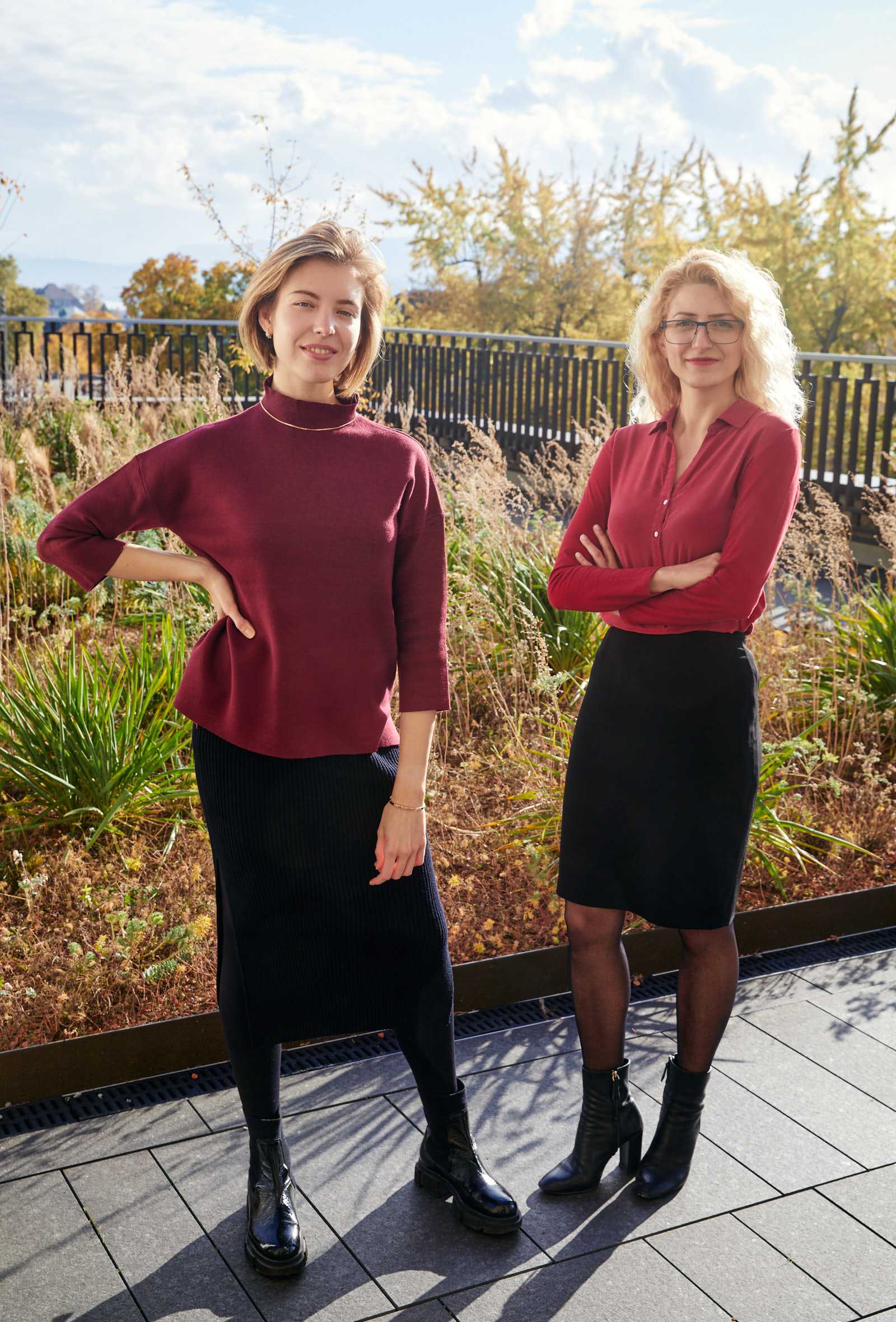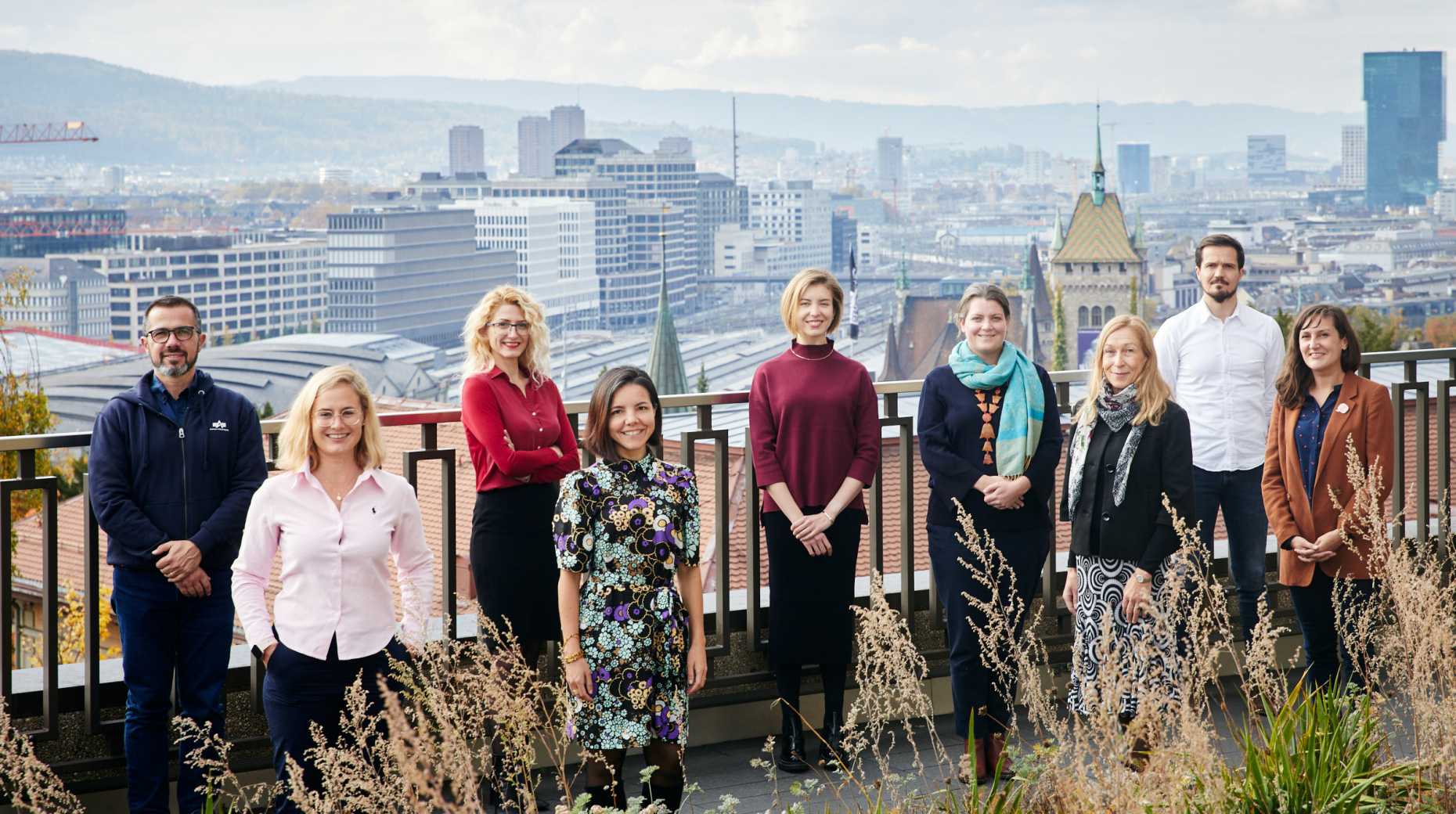Come together
Anna Kulakovskaya and Stefani Stefanova founded feMTEC, the gender equality association at D-MTEC. Their research may look quite different, but they are united in their determination to fight inequality.
This article is being published on 8 March. What does International Women’s Day mean to you?
Stefani Stefanova:
It is a great occasion to celebrate women’s accomplishments around the world, especially in the field of science and technology. Having received support and inspiration from strong female role-models throughout my life, I know that this can be of paramount importance in shaping young women’s futures. I hope this day reinforces everyone’s determination to continue empowering women worldwide as we progress towards an equal and inclusive society.
Anna Kulakovskaya:
I agree. It is a great opportunity to celebrate women’s achievements and reflect on the current gender-equality issues in our society. I myself feel inspired to join the #BreakTheBias movement, as I think exploring and reducing biases is crucial for creating a more gender-equitable world. Happy IWD!
Before we talk about your contributions to creating a gender equality association at D-MTEC, can you tell us how you came to D-MTEC?
Anna Kulakovskaya:
I discovered my passion for sustainability at the end of my Bachelor’s studies when I decided to write a thesis on the role of technology transfer in addressing climate change. I started digging into the topic and completed a Master’s programme in climate sciences, partly at ETH and partly at the University of Bern. I liked Zurich more, and after an internship at Swiss Re, I started my doctorate at the Chair of Sustainability and Technology in September 2019.
Stefani Stefanova:
I have been interested in economics and its potential to improve people’s lives for as long as I can remember. I was fortunate to be taught by great researchers who inspired me to seek answers to questions that have not yet been answered. When I got the opportunity to do that at ETH it was a no-brainer for me. I am proud to be part of D-MTEC and hope to make valuable contributions to society with my work here.
Economics is a broad field. Was there a specific topic that caught your attention?
Stefani Stefanova
My research is focused on income and wealth inequality. I believe this is one of the most relevant topics nowadays. A widening gap between top and bottom earners and between the rates of economic growth and rates of return to capital is putting the current economic system at risk. Therefore, in my research I aim at identifying the determinants of inequality as well as proposing policies for its reduction.
How do you go about fighting inequality in your research?
Stefani Stefanova:
I’m currently developing a fiscal redistribution model that allows for the international coordination of corporate taxation. This coordination will be designed to disincentivise firms from shifting profits through transfer pricing or tax havens, for example. At the same time, we are trying to find ways to shift the tax burden of funding healthcare, education and other public services away from the middle class. Many countries engage in destructive tax competition when it comes to corporations. This is a race to the bottom, lowering taxes to attract foreign capital. It might not be sustainable in the long run. I hope that with this model I can propose an alternative mechanism of reducing inequality.
Anna, what do you pursue in your research on sustainability?
Anna Kulakovskaya:
In my research I seek to facilitate the implementation of a sustainable circular economy. A circular economy is not always sustainable. When we talk about a sustainable circular economy, it means considering all the dimensions of sustainability: environmental, economic and social. I analyse if so-called circular strategies – such as rethink, reuse, remanufacture, recycling – are sustainable or not in economic terms. With this I hope to contribute to a holistic perspective on circular economy, and hence gain more understanding about its overall sustainability.
Can you give an example?
Anna Kulakovskaya:
I am currently focusing on the Swiss insulation industry. First, we assess through interviews with practitioners how reasonable it would be to implement certain circular strategies. Is it possible to reuse some of the material? Is recycling more feasible economically? Or can companies reduce environmental impacts during the production process, reducing costs at the same time? Then, I assess selected strategies quantitively.
In the next step we want to combine our economic assessment with the environmental assessment that is done in another research group. Bringing together the findings, we can determine win-win solutions in which we implement a strategy that is both economically and environmentally attractive.
Do you also consider policy in your analyses?
Anna Kulakovskaya:
Yes, this is the plan. If some strategies are attractive in terms of environmental impact, but very costly, then that provides a clear message to policymakers that we need to provide economic incentives. In that sense, policymakers are the target audience of our research, next to industry stakeholders.
Is there something that you’re particularly fond of in your research?
Anna Kulakovskaya:
I like diversity. I use both qualitative and quantitative methods. I plan to look at different industries. I assess different circular strategies. I also work with different people and engage in various discussions on the topic. This helps me to stay inspired and feel connected, which was challenging during the lockdown.
Given the contrast between your biographies as researchers, how did you find each other and how did feMTEC come to be?
Stefani Stefanova:
Today about two out of five doctoral candidates at D-MTEC are women, which is a big increase since 2015. Supporting this transition to a more gender equal academic community through initiatives like ours keeps up this momentum.
Since we still have fewer women than men in academia – only three professors at D-MTEC are women –, the creation of a gender-equality association was already on the to-do list of the Association of Scientific Staff at D-MTEC. Especially since every other department at ETH already had a gender equality association. Anna and I were more than happy to take the initiative onboard when we became members of the Scientific Staff Board.
What does gender equality mean in the context of a feMTEC vision?
Anna Kulakovskaya:
For me, gender equality is not about bringing everyone to the same level, making everyone equal, creating an absolutely homogeneous society. I think it’s important to appreciate differences while providing equal opportunities. Diversity is beautiful.
Stefani Stefanova:
We are all different and we have to respect and appreciate our differences and allow ourselves to grow within a community that is diverse. Hence, we strive for equality of opportunity, not of traits or features, and we also strive to create a sense of belonging. Underrepresented groups, such as women in academia, might not feel confident enough in their environment. It doesn’t have to be that way.
We are all different and we have to respect and appreciate our differences and allow ourselves to grow within a community that is diverse.Stefani Stefanova, Co-founder of feMTEC
How did you get the ball rolling?
Anna Kulakovskaya:
I was not too concerned about gender inequality five years ago. When the topic was raised at our department, I felt curious about it and wanted to dive deeper. The more I looked into it, the more I realised how important it is. I’m very happy to keep working on it now.
Stefani Stefanova:
I guess we were in the right place at the right time, because we both feel strongly about gender equality, community building and sustainability. We believe we can add to the general improvement of the work and study environment at D-MTEC through this kind of networking initiative.
As a core objective, we hope to inspire women to pursue research and a career in whatever sphere they choose and make D-MTEC a place where they feel they belong. At the same time, we want to contribute to the improvement of the work environment for all our colleagues, regardless of their gender. We want to be inclusive, and I’m really happy about how this aspect has worked out. Our team is growing and is very diverse. Our roughly twenty members include senior researchers, research assistants, Master’s students and doctoral candidates. Some are men and some are women.
Anna Kulakovskaya:
At the beginning, we brainstormed in a small group about what feMTEC could be. We then sent out a survey to all women at D-MTEC asking about their ideas, needs and concerns. Based on their responses, we started implementing some projects, the feMTEC monthly lunches or the workshop on gender biases on 10 March, for example. I want to emphasise that we don’t only target women. We want to be inclusive and provide equal opportunities for everyone.
Stefani Stefanova:
Other projects that sparked interest in the survey were discussions and guest talks, research seminars, networking events for team building and community building, and sustainability and greening initiatives. So, we have a large variety of events.
Are some events planned exclusively for women?
Stefani Stefanova:
Some of the events that are on the cards for us specifically target women: workshops on work-life balance, but also presentations from female researchers or industry experts showcasing the self-realisation of a woman in a field that is male-dominated. This spark can go a long way.
How do you feel the D-MTEC community is reacting to feMTEC?
Stefani Stefanova:
I don’t feel any obstruction. We’ve been well supported and now we even have volunteers. Things are expanding much faster than I expected, and I have a very good feeling about how far they can go.
Anna Kulakovskaya:
I haven’t noticed any external obstruction, either. The main constraint is that I have many other things competing for my attention – like my doctoral programme. Yet, I wish we had easier access to financial resources, as this will help us to organise more large-scale events.
How can one get involved or participate in your events?
Stefani Stefanova:
We cannot emphasise enough that we welcome anyone at D-MTEC who is interested in gender equality and community building. Join us at any of our events or just reach out to either of us. We send out emails to all D-MTEC members before an event and are more than happy to connect with people, even just to exchange ideas.
Anna Kulakovskaya:
My wish is that several projects of feMTEC run in parallel. While we focus on a workshop on gender bias, say, other people from feMTEC might be busy with greening initiatives. And I wish the number of feMTEC members increases over time – as mentioned earlier, everyone is welcome!
Connect with feMTEC
To find out more and get involved visit the feMTEC web page.


